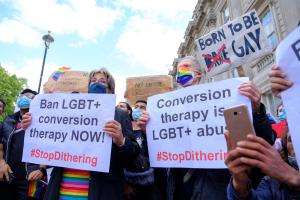Government criticised for removing transgender people from proposed ban on conversion therapy

Published by Professional Social Work magazine, 13 April, 2022
The government has become embroiled in dispute after indicating proposed legislation to outlaw conversion therapy will not apply to transgender people.
The rollback comes in the wake of concern from the Equality and Human Rights Commission (EHRC) that including trans people in the ban could have “unintended consequences”.
Prime Minister Boris Johnson has previously described conversion therapy – the attempt to change someone’s sexual orientation or gender identity – as “abhorrent”.
Such interventions, whether psychological, physical or spiritual, are fully or partially banned in other countries including Canada, Germany, Mexico and Australia.
Religious and gender critical groups, however, say a ban could criminalise parents and professionals from having wider discussions with children who have gender dysphoria.
The government says trans conversion therapy is being excluded because it’s a “legally complex area… particularly in the case of under-18s”.
More than 100 organisations pulled out of the UK’s first global government-led LGBT+ conference in protest at the government's decision and its LGBT business champion Iain Anderson has resigned from his post.
Protesters took to the streets in London, Belfast and Dublin last weekend carrying banners that included slogans such as “no ban without trans”.
A statement led by LGBT+ rights charity Stonewall accused the Prime Minister of breaking a promise to “protect people from the harms of conversion therapy”.
It said: “Trans people are no less worthy of respect, care and protection than cis lesbian, gay and bi people. If the UK government cannot stand behind and respect all LGBTQ+ people’s fundamental human rights, it should not be convening an LGBTQ+ rights conference on the global stage.”
Jane Fae, chair of Trans Media Watch, said: "It's not about therapy, it is not even about talking, it is about mistreatment, abuse and in some cases torture.”
A 2017 government survey found transgender men nearly twice as likely to have been offered conversion therapy as gay and bisexual people. Faith groups were the most likely to have conducted it.
That year a Memorandum of Understanding (MOU) on Conversion Therapy in the UK condemning such practices was signed by NHS England, NHS Scotland, The British Psychological Society, Relate and 16 other organisations.
It described conversion therapy as “unethical and potentially harmful” adding that “neither sexual orientation nor gender identity in themselves are indicators of a mental disorder”.
However, the document says this should not stop professionals working with trans and gender non-conforming "clients from performing a clinical assessment of suitability prior to medical intervention”.
It stresses professionals must have an understanding of gender and sexual diversity and be “free from any agenda that favours one gender identity or sexual orientation”.
A government consultation that closed in February asked if talking therapies aimed at changing a person’s sexual orientation or gender identity should be considered a criminal offence.
In a joint response, BASW England, BASW Cymru and the Social Workers Union have called for a comprehensive ban on conversion therapy.
The EHRC said it supports a ban in principle, though warned of “unintended consequences”, particularly regarding children.
It said healthcare and professionals may be deterred from offering “legitimate professional services due to a fear of being caught by the proposed ban”.
The EHRC said further consideration is needed before legislation finalised.
Scotland, however, has backed a “trans inclusive” ban on conversion therapy.
The Scottish parliament is also considering reforms to make it easier and faster to obtain recognition of gender change.
Conversations about gender have grown in recent years with more young people being open about trans or non-binary identities.
Major medical bodies in the UK have signed the MOU in support of gender identity and the Gender Recognition Act allows for people to legally change their gender.
‘Gender critical’ supporters maintain a person’s sex is biological and immutable.
Such divisions have also played out within social work.
Vanessa Bell, a social worker employed in the fostering sector, favours the government excluding transgender people from the conversion therapy ban. She said: “In my opinion the social work profession should welcome the government’s decision, as it will safeguard children and young people experiencing gender dysphoria from being pushed down a potentially irreversible path of medicalisation.”
However, Dr Paul Willis, associate professor in social work at the University of Bristol, said: “This is not about preventing helping professionals and clinicians from having supportive conversations with children and young people about gender and identity.
“It’s about banning harmful and unethical practices that have been condemned by peak bodies such as the British Psychological Society, British Association for Counselling and Psychotherapy, NHS England, British Medical Association and the UN.
“Social workers are committed to achieving social justice and that means supporting and joining LGBT groups and organisations in their demands for the UK government to deliver on its promise and fully ban conversation therapies for LGBT and trans people.”
BASW’s position statement on social work with transgender people can be seen here
